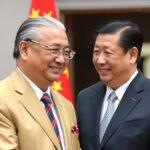India Strengthens Ties with Sri Lanka Through Defence and Energy Deals
During Prime Minister Narendra Modi’s visit to Sri Lanka, India secured key defence and energy deals to counter China’s influence. A five-year defence cooperation agreement was signed, focusing on military training and technology sharing. The leaders celebrated a revived solar project, highlighting strong bilateral relations. These developments come amid Sri Lanka’s efforts to balance relationships with both India and China.
During Prime Minister Narendra Modi’s recent visit to Sri Lanka, India established critical defence and energy agreements aimed at countering China’s increasing influence in the region. Sri Lankan President Anura Kumara Dissanayake expressed gratitude for Modi’s support, awarding him the highest civilian honor for fostering strong bilateral relations. Modi noted, “We believe that our security interests are aligned,” emphasizing the interconnected nature of both nations’ security concerns.
The newly signed five-year defence cooperation agreement includes provisions for training Sri Lankan military personnel in India and facilitates the sharing of vital information and technology. President Dissanayake affirmed Sri Lanka’s commitment, stating, “I have reiterated our position to Prime Minister Modi that Sri Lankan territory will not be allowed to be used by anyone to undermine India’s security.”
Modi’s visit coincided with the restart of a significant solar power project—a 120-megawatt plant in northeastern Trincomalee—previously stalled, now back on track due to support from India. As Sri Lanka navigates its complex relations with both New Delhi and Beijing, India’s concerns grow regarding potential Chinese dominance in the nation.
Dissanayake’s earlier visits to New Delhi and Beijing underscore Sri Lanka’s strategic balancing between the two regional powers. China is currently Sri Lanka’s largest creditor, holding over half of its $14 billion bilateral debt when the nation defaulted in 2022. As part of a larger economic cooperation framework, Colombo recently secured a $3.7 billion investment from a Chinese state-owned entity to develop an oil refinery, marking the largest foreign investment in Sri Lanka to date.
This visit follows Modi’s engagements with neighboring nation leaders to strengthen regional ties. At the Bangkok BIMSTEC summit, he had significant discussions with leaders from Myanmar, Bangladesh, Nepal, and Bhutan, charting a path toward renewed collaborations in the region.
In conclusion, Prime Minister Narendra Modi’s visit to Sri Lanka not only solidified India’s defence and energy partnerships but also reinforced regional security amidst rising Chinese influence. The agreements and ongoing projects reflect the commitment to shared interests and strategic cooperation between the two nations, essential for navigating their geopolitical landscape. As Sri Lanka balances its relationships with India and China, these developments could significantly impact the region’s dynamics moving forward.
Original Source: www.france24.com








Post Comment